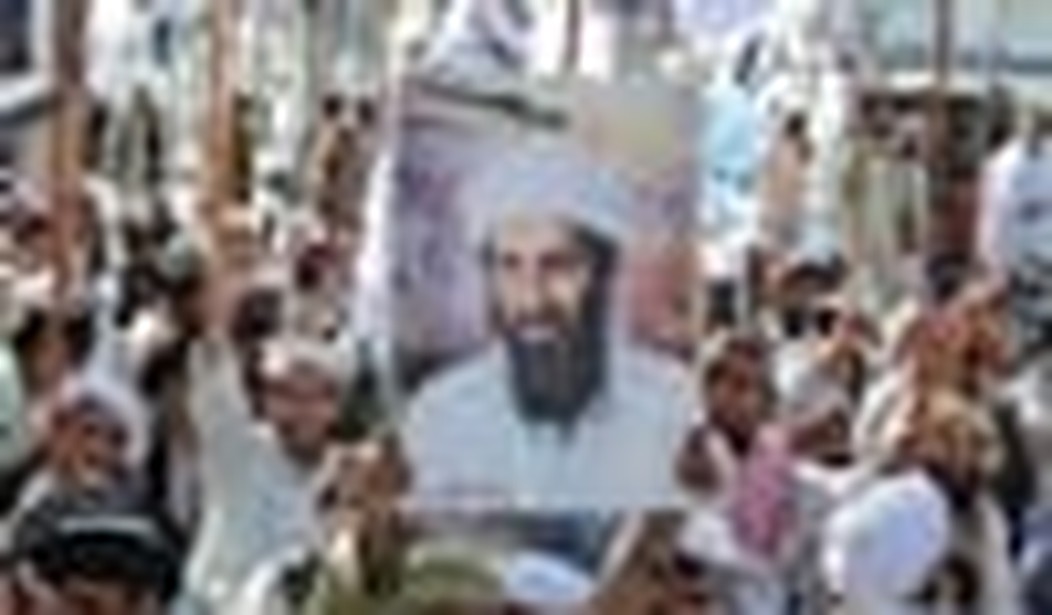In the wake of Osama bin Laden’s death, I am reminded of that great Navy SEAL commercial where there’s no words or music — just footprints on a beach being washed away by the waves. It recalls George Orwell’s observation that we sleep peaceably in our beds at night “because rough men stand ready to do violence on our behalf.” U.S. Special Forces are the best in the business, and the bin Laden operation shows the persistent lethality and reach of the U.S. military.
As for President Obama — good for him. This is the first time he’s coming across like a true commander-in-chief. It’s his best moment. Some conservatives will no doubt temper their joy over bin Laden’s death with the thought that this will help President Obama in 2012. My advice: now is not the time for such thoughts. Rejoice. The election in 2012 will be about the $14 trillion debt and the price of skim milk. But this will certainly be a feather in Obama’s cap. The operation happened on his watch and so he will reap the requisite historical rewards. The full truth will emerge over time. For instance, the intelligence that led to bin Laden came from interrogating terrorists at those maligned secret CIA prisons and detainees at Guantanamo Bay.
So for now, enjoy the irony. Obama got Osama! If you told that to an American in the weeks after 9/11, they’d probably ask “Who’s Obama?” “Oh, he’s a guy in Chicago.” What a country.
Our serious attention should turn now to the broad strategic implications emanating from this raid. American policymakers will be forced to rethink the charade that is the U.S.-Pakistan alliance. President Obama stated that “our counterterrorism cooperation with Pakistan helped lead us to bin Laden and the compound where he was hiding.” But is this true? If it is, how is it true? Why didn’t we forewarn the Pakistanis about this raid before it happened? Were we worried they would tip bin Laden off, leaving him enough time to escape?
Think about it. Osama bin Laden was the most wanted man in the world since the mid-1990s. There was a very large bounty on his head. He was particularly tall and recognizable. And he was found in a $1 million mansion 35 miles from Pakistan’s capital, in the same town as Pakistan’s West Point-like military academy. There is no way the Pakistanis were unaware of Osama bin Laden’s location.
As Steve Coll writes: “It stretches credulity to think that a mansion of that scale could have been built and occupied by bin Laden for six years without its coming to the attention of anyone in the Pakistani Army.”
President Asif Ali Zardari has a lot of explaining to do. A Pakistani intelligence official told CNN that Pakistan “passed along raw phone-tap data to the United States that eventually led to Osama bin Laden’s killing, but they failed to analyze or interpret the information themselves.” That sounds fishy and contrived.
It’s hard to imagine Osama bin Laden surviving in a cave for a decade. Who did we think he was, Cody Lundin? No. It makes perfect sense that he was being protected. There was bin Laden’s videotaped message to the United States on the eve of the 2004 presidential election, which clearly looked like it was recorded in a studio. Pakistan’s intelligence agency, the ISI, has been known as a “state within a state” for some time. It supports Mullah Omar’s Taliban, the deadly Haqqani network, and is said to have orchestrated the barbaric Mumbai attacks in 2008.
So where should we go from here?
Well, we should force the Pakistanis to justify their statements. We should ask them to explain why they deserve an occasional $7 billion in U.S. aid to fight terrorism. We should forewarn them that we will continue to conduct operations like this inside their territory — against Ayman al-Zawahiri, against Mullah Omar — whenever we damn well please. We should warm to the Indians, our true allies. We should establish a counterintelligence sub-department specifically focused on Pakistan’s ISI.
Like the Second Gulf War, the Afghan-American War, which will enter its tenth year in October, was always a proxy conflict in a regional war. President Obama likes to call it the “Af-Pak” theater. In truth, the conflict should be called the Pashtun Insurrection. This is what the war is about: killing bin Laden, killing Zawahiri, killing Omar, destroying al-Qaeda, and bombarding the Taliban from the air day and night.
Unfortunately, in many respects, the war has become social work. We should be encouraging free political and economic systems in Afghanistan, but that should not be the main objective. We’re currently placing strategic importance on local operations while avoiding the real strategic implications of South Asian geopolitics as a whole. In the aftermath of Osama bin Laden’s death, we ought to take the time to consider how and when we will invariably reverse this trend for the long term.
Afghanistan is about Pakistan and India. Let’s acknowledge that. And let us learn, and then never forget, where Pakistan stood in the fight against Osama bin Laden. As Obama’s predecessor once said — “You’re either with us or against us.”









Join the conversation as a VIP Member